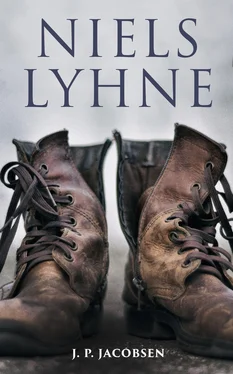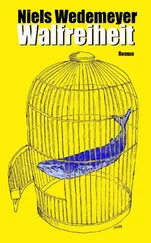J. P. Jacobsen - Niels Lyhne
Здесь есть возможность читать онлайн «J. P. Jacobsen - Niels Lyhne» — ознакомительный отрывок электронной книги совершенно бесплатно, а после прочтения отрывка купить полную версию. В некоторых случаях можно слушать аудио, скачать через торрент в формате fb2 и присутствует краткое содержание. Жанр: unrecognised, на английском языке. Описание произведения, (предисловие) а так же отзывы посетителей доступны на портале библиотеки ЛибКат.
- Название:Niels Lyhne
- Автор:
- Жанр:
- Год:неизвестен
- ISBN:нет данных
- Рейтинг книги:4 / 5. Голосов: 1
-
Избранное:Добавить в избранное
- Отзывы:
-
Ваша оценка:
- 80
- 1
- 2
- 3
- 4
- 5
Niels Lyhne: краткое содержание, описание и аннотация
Предлагаем к чтению аннотацию, описание, краткое содержание или предисловие (зависит от того, что написал сам автор книги «Niels Lyhne»). Если вы не нашли необходимую информацию о книге — напишите в комментариях, мы постараемся отыскать её.
Niels Lyhne — читать онлайн ознакомительный отрывок
Ниже представлен текст книги, разбитый по страницам. Система сохранения места последней прочитанной страницы, позволяет с удобством читать онлайн бесплатно книгу «Niels Lyhne», без необходимости каждый раз заново искать на чём Вы остановились. Поставьте закладку, и сможете в любой момент перейти на страницу, на которой закончили чтение.
Интервал:
Закладка:
“It was lying here,” he added hurriedly, “here on the ground like this—just like this,” and he bent down to show where it had lain with an inconsequential minuteness born of his confusion. He felt almost happy in his relief at having given some sign of life, however futile. He was still standing with the hat in his hand.
“Do you intend to keep it?” asked Edele.
Bigum had no answer to that.
“I mean will you give it to me?” she explained.
Bigum came a few steps nearer and handed her the hat. “Miss Lyhne,” he said, “you think—you must not think—I beg you to let me speak; that is—I am not saying anything, but be patient with me!—I love you, Miss Lyhne, unutterably, unutterably, beyond all words I love you. Oh, if language held a word that combined the cringing admiration of the slave, the ecstatic smile of the martyr, and the gnawing homesickness of the exile, with that word I could tell you my love. Oh, listen to me, do not thrust me away yet! Do not think that I am insulting you with an insane hope! I know how insignificant I seem in your eyes, how clumsy and repulsive, yes, repulsive. I am not forgetting that I am poor,—you must know it,—so poor that I have to let my mother live in a charitable institution, and I can’t help it, can’t help it. I am so miserably poor. Yes, Miss Lyhne, I am only a poor servant in your brother’s house, and yet there is a world where I am ruler, powerful, proud, rich, with the crown of victory, noble by virtue of the passion that drove Prometheus to steal the fire from the heaven of the gods. There I am brother to all the great in spirit, whom the earth has borne, and who bear the earth. I understand them as none but equals understand one another; no flight that they have flown is too high for the strength of my wings. Do you understand me? Do you believe me? Oh, don’t believe me! It isn’t true, I am nothing but the Kobold figure you see before you. It is all past; for this terrible madness of love has paralyzed my wings, the eyes of my spirit have lost their sight, my heart is dried up, my soul is drained to bloodless poltroonery. Oh, save me from myself, Miss Lyhne, don’t turn away in scorn! Weep over me, weep, it is Rome burning!”
He had fallen to his knees on the steps, wringing his hands. His face was blanched and distorted, his teeth were clinched in agony, his eyes drowned in tears; his whole body shook under the suppressed sobs that were heard only as a gasping for breath.
“Control yourself, Mr. Bigum,” she said in a slightly too compassionate tone. “Control yourself; don’t give way so, be a man! Please get up and go down into the garden a little while and try to pull yourself together.”
“And you can’t love me at all?” groaned Mr. Bigum almost inaudibly. “Oh, it’s terrible! There is not a thing in my soul that I wouldn’t murder and degrade if I could win you thereby. No, no, even if any one offered me madness and I could possess you in my hallucinations, possess you, then I would say: Take my brain, tear down its wonderful structure with rude hands, break all the fine threads that bind my spirit to the resplendent triumphal chariot of the human mind, and let me sink in the mire of the physical, under the wheels of the chariot, and let others follow the shining paths that lead to the light! Do you understand me? Can you comprehend that even if your love came to me robbed of its glory, debased, befouled, as a caricature of love, as a diseased phantom, I would receive it kneeling as if it were the Sacred Host? But the best in me is useless, the worst in me is useless, too. I cry to the sun, but it does not shine; to the statue, but it does not answer—answer!... What is there to answer except that I suffer? No, these unutterable torments that rend my whole being down to its deepest roots, this anguish is nothing to you but an impertinence. You feel nothing but a little cold offence; in your heart you laugh scornfully at the poor tutor and his impossible passion.”
“You do me an injustice, Mr. Bigum,” said Edele, rising, while Mr. Bigum rose too. “I am not laughing. You ask me if there is no hope, and I answer: No, there is no hope. That is surely nothing to laugh at. But there is one thing I want to say to you. From the first moment you began to think of me, you must have known what my answer would be, and you did know it, did you not? You knew it all the time, and yet you have been lashing all your thoughts and desires on toward the goal which you knew you could not reach. I am not offended by your love, Mr. Bigum, but I condemn it. You have done what so many people do: they close their eyes to the realities and stop their ears when life cries ‘No’ to their wishes. They want to forget the deep chasm fate has placed between them and the object of their ardent longing. They want their dream to be fulfilled. But life takes no account of dreams. There isn’t a single obstacle that can be dreamed out of the world, and in the end we lie there crying at the edge of the chasm, which hasn’t changed and is just where it always was. But we have changed, for we have let our dreams goad all our thoughts and spur all our longings to the very highest tension. The chasm is no narrower, and everything in us cries out with longing to reach the other side, but no, always no, never anything else. If we had only kept a watch on ourselves in time! But now it is too late, now we are unhappy.”
She paused almost as if she woke from a trance. Her voice had been quiet, groping, as if she were speaking to herself, but now it hardened into a cold aloofness.
“I cannot help you, Mr. Bigum. You are nothing to me of what you wish to be. If that makes you unhappy, you must be unhappy; if you suffer, you must suffer—there are always some who have to suffer. If you make a human being your God and the ruler of your fate, you must bow to the will of your divinity, but it is never wise to make yourself gods, or to give your soul over to another; for there are gods who will not step down from their pedestals. Be sensible, Mr. Bigum! Your god is so small and so little worth your worship; turn from it and be happy with one of the daughters of the land.”
With a faint little smile, she went in through the summer parlor, while Mr. Bigum looked after her, crestfallen. For another fifteen minutes he walked up and down before the steps. All the words that had been spoken seemed to be still vibrating through the air; she had so lately gone, it seemed that her shadow must still linger there; it seemed that she could not yet be out of reach of his prayers, and everything could not be inexorably ended. But after a while the chambermaid came out and gathered up the engravings, carried in the chair, the portfolios, the rush matting—everything.
Then he could go too.
In the open gable window up above, Niels sat gazing after him. He had heard the whole conversation from beginning to end. His face had a frightened look, and a nervous trembling passed through his body. For the first time he was afraid of life. For the first time his mind grasped the fact that when life has sentenced you to suffer, the sentence is neither a fancy nor a threat, but you are dragged to the rack, and you are tortured, and there is no marvellous rescue at the last moment, no awakening as from a bad dream.
He felt it as a foreboding which struck him with terror.
* * * * *
Edele did not have a good autumn, and the winter drained her strength completely. Spring, when it came, did not find one poor little life-germ that it could warm and coax into growth; it found only a withering, which no gentleness and no warmth could arrest or even retard. But it could at least pour a flood of light over the paling life and caress the ebbing strength with fragrant, balmy air, as the evening crimson follows slowly in the wake of dying day.
Читать дальшеИнтервал:
Закладка:
Похожие книги на «Niels Lyhne»
Представляем Вашему вниманию похожие книги на «Niels Lyhne» списком для выбора. Мы отобрали схожую по названию и смыслу литературу в надежде предоставить читателям больше вариантов отыскать новые, интересные, ещё непрочитанные произведения.
Обсуждение, отзывы о книге «Niels Lyhne» и просто собственные мнения читателей. Оставьте ваши комментарии, напишите, что Вы думаете о произведении, его смысле или главных героях. Укажите что конкретно понравилось, а что нет, и почему Вы так считаете.












